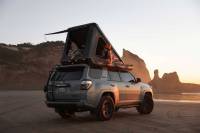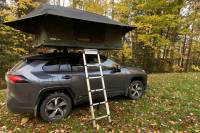It’s hard to argue that $16,000 is affordable — unless you’re talking about truck campers. That’s the starting price of Total Composites DIY truck camper, a composite habitat for your truck bed that’s a blank slate to outfit as you like. Here’s how it works.
Total Composites truck campers are some of the first that let the owner start from scratch and make it their own. When I was shopping for a truck camper, every one I found was loaded with “features” I didn’t want, like a mid-grade microwave and an expensive air conditioner that only works when I’m plugged in. It’s my goal to never be plugged in.
There were windows where I wanted to put bunk beds. Faux wood paneling was everywhere, a design aesthetic that is like fingernails on a chalkboard to me.
But the Total Composites camper is a simple composite box with legs and a door. You design and outfit it how you want it, starting with where you put the windows and how many.
I was intrigued by the idea of a thermally-efficient truck camper I could outfit myself, one that comes as a blank slate that I could design to fit my budget, style, and needs. With an “affordable” starting price and a quality reputation and warranty to back it up, the Total Composites truck camper seems like an impressive value.
Let’s dive into what this camper is all about.
Total Composites DIY Truck Campers
Total Composites was started by Andreas Schwall, a German expat who relocated to British Columbia, Canada. He was a furniture-maker, a paramedic, and a builder of high-end expedition trucks before moving to Canada to settle down.
“When I moved to Canada in 2001, I managed cabinet shops, I had my own woodworking shop, but the fascination with expedition trucks never left me,” said Schwall. “Everything I could find in the U.S. in the early 2000s was a shitty RV. I wanted to build my own.”
Conveniently, Schwall’s dad, a German plastics engineer, had teamed up with a former Chinese customer to set up a factory in China and build commercial truck bodies to German standards, with German components, for the Chinese market. In 2015, Schwall imported one of his dad’s highly thermally efficient, lightweight kits and modified it into a camper.
He quickly found himself in the import business. Friends, including those from online chatrooms, followed his build and wanted one too. Interest snowballed. Schwall tweaked the truck body design, honing wall thickness and features for campers, not cargo, turning Total Composites into a multimillion-dollar business.
Total Composites: Truck Camper Design
Extensive Research, Expensive Investment

For the first 6 years, Total Composites stuck to expedition-style campers: large composite boxes mounted on commercial trucks. In 2021, it released its first truck camper that would fit a normal consumer pickup.
“For many years, people had asked me if I could make a truck camper,” said Schwall. “There was no way to adapt the truck boxes we were manufacturing for expedition use into a camper to fit into the bed of a pickup. We couldn’t get the wheel well shape. I turned those inquiries down, until one day I thought, ‘What the heck?’”
Schwall grabbed a tape measure and visited every truck dealership he could find to take bed measurements. Then he sat down to map out how to maximize internal space while maintaining trail performance.
“A lot of Jeep Gladiator and Taco owners have steel bumpers all over the place. And they like to go off road. For the Taco-sized camper, I wanted to build a camper that would let owners close the tailgate and still use a steel bumper with a spare tire,” said Schwall.
“For the F-150 camper, we maximized what we could do with interior and bed size without hanging the camper over the back of the truck. User-friendliness was top of mind. We wanted to be able to slide the camper in without modifying the truck.”
The day he decided to build truck campers was an expensive day for Schwall. To make truck campers, Total Composites had to invest in custom pultrusions, the fiber-reinforced polymer pieces that hold the camper corners together, which was an investment of over $80,000.
“It was a huge commitment to develop it,” he said. “We put the first couple together as proof of concept. With the feedback we got, we tweaked the overall dimensions and landed where we are today.”
Top-Notch Insulation
Besides offering a blank canvas to build out as you’d like, one of the things that sets Total Composites truck campers apart from pop-top or other truck campers is their insulation.
“Out in cold, our campers really shine,” said Schwall. “You need less energy to keep them heated, they stay warm way longer, and there’s no condensation. You won’t wake up with soaked pillows and comforter trying not to touch the camper walls.”
Total Composites achieved a condensation-free camper by eliminating aluminum beams and anything else that will transfer heat and cold from inside to outside and visa-versa from inside the wall.
The camper’s structure comes from the bonded fiberglass-covered foam walls. Custom-fabricated fiberglass extruded corners — Schwall’s Pultrusions — give the camper structural soundness without thermal transfer. Because there aren’t structural materials that expand and contract at different rates with temperature changes, there isn’t stress cracking over time. But because there are no structural beams, building out this camper required glue not screws.
Schwall says it’s a reliable if unconventional system. Total composites campers and expedition boxes are all assembled with a low-VOC, UV-stable, food-safe, polyurethane adhesive that stays flexible for at least 25 years. They sell the same to customers to glue on roof rack mounts, cabinetry, and more.

Total Composites Truck Camper: Who It’s For
So far, Total Composites has about 350 expedition trucks on the road in North America, and around 90 truck campers. Schwall acknowledges that Total Composites Truck Camper isn’t for everybody.
“If you’re most interested in aerodynamics, or you need your truck and camper to fit into a garage, this might not be the right setup for you. If you’re into winter sports, or you want to spend a lot of time outside including when it’s shitty weather, you’ll be comfortable in our truck camper,” he said.
Having previously owned and recently sold a pop-up camper, I’m excited to try one. While on one hand popping the top roadside wasn’t a big deal, it was kind of a pain. If I stopped to get groceries or needed to grab gear from inside, I’d have to lift the roof. In this camper, I’ll be able to throw groceries in the fridge, hop in the driver’s seat and keep going.
Behind the Scenes: Total Composite Manufacturing and Materials
While the panels and corners Schwall uses to make Total Composites campers are made in China, Total Composites truck campers are worlds away from what you’ll get if you order from Ali Baba.
“Buy from us and you get a camper made with German materials manufactured to German standards. We also have a proven track record. You have a service point of contact and someone to talk to when you have questions. And we won’t drop the ball in a warranty case,” Schwall said.
Plus, the company is authentic. He and his staff are avid campers and overlanders.

“We don’t just staple shit together like a regular RV manufacturer,” said Schwall. “It’s really important for people to understand that we live and breathe these products. And we only recommend components we use ourselves. What people get from us is expertise based on experience and a really good product that is a tool for fun and adventure. That is our goal.”
Total Composites offers a 2-year warranty on materials and craftsmanship.
Get a DIY Truck Camper in Just 12 Weeks
There are other DIY campers on the market, including the Scout Toho and Four Wheel Campers Project M. I called both to see how soon I could get one, and the answer was more than a year. Project M costs less — it starts under $10,000 — but it’s a pop-top, has no floor, and lacks the insulation of Total Composites. The Scout is similar in design to the Total Composites truck camper but comes partially outfitted and costs considerably more — starting at around $26,000.
For now, you can pick up a Total Composites camper at a dealership in Washington state or at Total Composites HQ in Victoria, British Columbia. Dealers in California, Washington, Alberta, and eastern Canada are imminent. Delivery time is currently three to four months — considerably less than the current industry norm.
The 5’ Total Composites camper, which fits Jeep Gladiators and Toyota Tacomas, fits inside the tailgate, weighs 510 pounds empty without a door, and costs $15,999. The 7700 Camper, which fits Ford F-150/250, and Ram 1500/2500, is 795 pounds empty and costs $16,999.
I was impressed enough to order one — especially since I can get one in a reasonable time frame. I’ll start building mine out in May. Stay tuned for a proper review after I spend some time with the Total Composites truck camper.
To get more info or to order your own Total Composites truck camper, go to TotalComposites.com.






